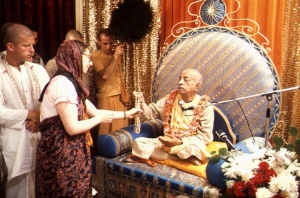SB 8.9.4

A.C. Bhaktivedanta Swami Prabhupada
TEXT 4
- na vayaṁ tvāmarair daityaiḥ
- siddha-gandharva-cāraṇaiḥ
- nāspṛṣṭa-pūrvāṁ jānīmo
- lokeśaiś ca kuto nṛbhiḥ
SYNONYMS
na—it is not; vayam—we; tvā—unto You; amaraiḥ—by the demigods; daityaiḥ—by the demons; siddha—by the Siddhas; gandharva—by the Gandharvas; cāraṇaiḥ—and by the Cāraṇas; na—not; aspṛṣṭa-pūrvām—never enjoyed or touched by anyone; jānīmaḥ—know exactly; loka-īśaiḥ—by the various directors of the universe; ca—also; kutaḥ—what to speak of; nṛbhiḥ—by human society.
TRANSLATION
What to speak of human beings, even the demigods, demons, Siddhas, Gandharvas, Cāraṇas and the various directors of the universe, the Prajāpatis, have never touched You before. It is not that we are unable to understand Your identity.
PURPORT
Even the asuras observed the etiquette that no one should address a married woman with lust. The great analyst Cāṇakya Paṇḍita says, mātṛvat para-dāreṣu: one should consider another's wife to be one's mother. The asuras, the demons, took it for granted that the beautiful young woman, Mohinī-mūrti, who had arrived before them, was certainly not married. Therefore they assumed that no one in the world, including the demigods, the Gandharvas, the Cāraṇas and the Siddhas, had ever touched Her. The demons knew that the young girl was unmarried, and therefore they dared to address Her. They supposed that the young girl, Mohinī-mūrti, had come there to find a husband among all those present (the Daityas, the demigods, the Gandharvas and so on).